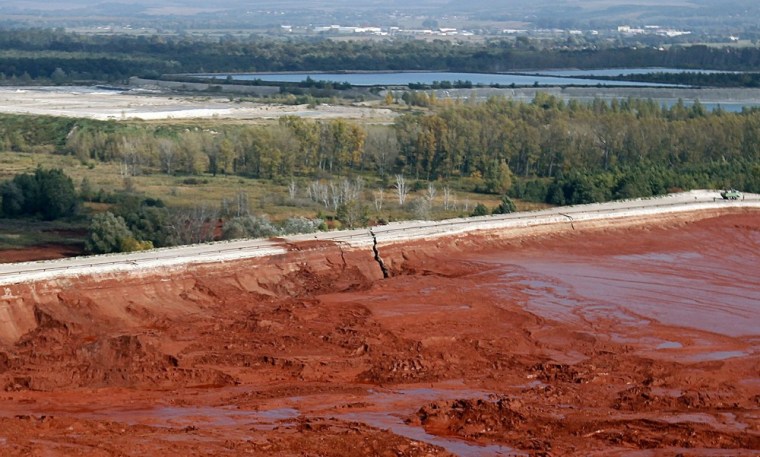The wall of a reservoir filled with caustic red sludge will inevitably collapse and unleash a new deluge of red sludge that could flow about a half-mile to the north, a Hungarian official said Sunday.
That would flood parts of the town already hit by the industrial waste on Monday but stop short of the next town to the north.
Environmental State Secretary Zoltan Illes said recently discovered cracks on the northern wall of the reservoir at the alumina plant have temporarily stopped widening because of favorable weather conditions but will continue to expand, especially at night.
The reservoir could collapse "within one day or a week," he said.
Disaster agency spokesman Tibor Dobson said engineers didn't detect any new cracks overnight, and the older cracks were being repaired, but that it was too soon to consider lowering the current state of alert.
Protective walls were being built around the reservoir's damaged area to hold back any further spills and a 2,000-foot long dam was under construction to save the areas of the town of Kolontar not directly hit by Monday's disaster.
"I would describe the situation as hopeful, but nothing has really changed," Dobson told The Associated Press. "The wall to protect Kolontar is planned to be finished by tonight, but it will likely be several days before residents may be able to move back."
Gyorgyi Tottos, a spokeswoman for disaster crews, called it "a race against time as good weather is forecast for the coming few days but then the rain will come."
Nearly all of Kolontar's 800 residents were evacuated Saturday, when Prime Minister Viktor Orban said the north wall of the massive storage pool — which is 24.7 acres in size — was expected to "very likely" collapse after cracks were detected at several points along the dam.
The roughly 6,000 residents of neighboring Devecser, just north of Kolontar, were told by police Saturday to pack a single bag and get ready to leave at a moment's notice.
"This hasn't changed," Dobson said. "We are still on guard in case of any more spills."
The owners of the alumina plant expressed their condolences Sunday to the families of the seven people killed, as well as to those injured — and said they were sorry for not having done so sooner.
The company also said it was willing to pay compensation "in proportion to its responsibility" for the damage caused by the deluge.
Red sludge is a byproduct of the refining of bauxite into alumina, the basic material for manufacturing aluminum. Treated sludge is often stored in ponds where the water eventually evaporates, leaving behind a largely safe red clay. Industry experts say the sludge in Hungary appears to have been insufficiently treated, if at all, meaning it remained highly caustic.
Illes, commenting to reporters during a tour of the affected villages and the damaged reservoir, confirmed that red sludge stored in Hungarian reservoirs was not treated to reduce its alkalinity.
On Monday, the sludge flooded three villages in less than an hour, burning people and animals. At least seven people were killed and at least 120 were injured. Several of those who were hospitalized were in serious condition. Around 184 million gallons of the caustic red sludge was released.
The red sludge devastated creeks and rivers near the spill site and entered the Danube River on Thursday, moving downstream toward Croatia, Serbia and Romania. But the volume of water in the Danube appeared to be blunting the sludge's immediate impact.
Illes said that neutralizing chemicals poured into primary and secondary tributaries of the Danube, as well as efforts to remove as much red sludge as possible from the waterways, was able to prevent ecological damage to Europe's second-longest river.
Orban said he would inform parliament on Monday about the findings of an investigation and promised the "toughest possible consequences" to ensure such a disaster does not recur.
He added that the government would not decide before Monday whether the company that owns the damaged reservoir can resume production.
Shutting down the alumina factory would threaten the livelihood of several thousand people.
In Romania, local authorities were testing the water Sunday every four hours in the village of Bazias where the Danube enters Romania from Serbia, and will continue to carry out tests all this week, said Adrian Draghici, director of Romanian water for Mehedinti county.
Romanian fishermen sailed out into the Danube and villagers fished on the banks of the river for pike, which is plentiful in the Danube. They seemed unperturbed by any potential hazards.
But local authorities warned residents about letting animals drink from the Danube and urged them to be careful with fishing, as a precautionary measure.
